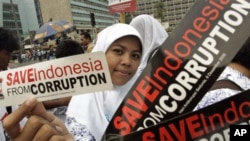Indonesians are so fed up with corruption that they are starting to take matters into their own hands. In one high-profile case, an independent group is offering $17,000 for information leading to the capture of Muhammad Nazaruddin, a prominent politician who fled the country after being accused of corruption. Many Indonesians tell pollsters that corruption is the nation's number-one problem, despite repeated pledges from politicians to root it out.
One woman's effort
Widi Wiramotko is an angry woman. The petite mother of three clutches a thick file that, she says, contains proof of how rotten her children’s school is: the documents show the school requires parents to pay for services already financed by the state.
Widi explains that she got the documents when she served as a representative of parents on a school committee. The committee refused to sign off on the administration’s proposed budget because they suspected wrongdoings. As a result, all parents were kicked out of the committee and, she says, her son was harassed by the administration.
Widi and a dozen other parents have joined forces to bring cases of corruption to the courts. They are helped by Indonesian Corruption Watch or ICW, the country’s leading independent organization that targets graft. Ade Wirawan is a researcher at ICW who has been studying corruption in schools.
“In Indonesia, it’s very hard to find a clean school, and very easy to find a corrupt one. One of my contacts who is a school principal even told me that there is not one school in the whole country that is not corrupt,” Ade said.
Systematic problem
Ade Wirawan’s recent report on corruption in schools says that graft in the education system goes far beyond the problem of students bribing teachers for passing grades on exams. It’s systematic.
“Corruption takes a lot of different shapes. For the parents, it’s pure extortion. For example, if so-and-so’s parents don’t give money, he won’t receive his school certificate,” Ade noted.
Ade says that everyone in a position of authority gets their share of bribe money. Professors accept so-called gifts to whisper exam answers to students; the school’s administration demands a fee for services already paid for by the Department of Education.
But schools also have ways of inflating their bills to bilk more money from the state. Ade says that schools inflate the prices of purchases for equipment and services by two or three times. He says that in some ways, this corruption is necessary to survive in a system that demands such illicit payments from everyone.
“But we’ve also discovered that the schools themselves are victims of extortion from the state administration. Sometimes it’s voluntary, for example they’ll pay in order to make sure that the school principal’s job is safe, that he will not be sent far away," Ade noted. "But sometimes it’s also extortion: the school doesn’t want to pay but it’s forced to. You want to have a permit to build or repair a classroom? You have to pay. And that explains why most Indonesians schools are in such state of disrepair.”
After the 1998 Asian crisis crippled the Indonesian economy, schools imposed fees on parents because of a lack of funding. So in 2005 the central government launched a massive plan known in English as the School Operation Fund that pumped billions of rupiah directly into schools. The effort effectively doubled the education budget between 2000 and 2006, to reach $14 billion or 16 percent of all government spending.
That was one of the main reasons for President Yudhoyono’s triumphant re-election in 2009.
Misuse of funds
But parents say despite the government's lofty goals, the money is not reaching the classrooms.
Efrida, a mother of three who, like many Indonesians, goes only by one name, says she first suspected corruption in her kids’ school when the administration asked parents to pay for registration fees - something that should be covered by the government. She says the school’s principal refused to answer her questions about why the money was needed.
Ade Wirawan from ICW estimates that 40 to 50 percent of the education budget disappears before it reaches the children. That is a big loss for the country. The World Bank says that the lack of a properly educated workforce in Indonesia remains a major obstacle to faster economic growth.
For parents such as Sulaeman, it is also a question of morals.
Sulaeman asks if one teacher is corrupt, what does his behavior teach his 30 pupils? And what type of citizens will the education system produce?
Analysts say the government still needs to make massive changes to its system so that parents can refuse to pay unlawful fees and schools can say no to greedy administrators. Until then, they say, tough lessons in corruption will continue to be a part of schools’ unofficial curriculum.




